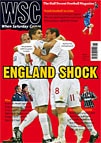 Josh Widdicombe watches a remade film about football fighting
Josh Widdicombe watches a remade film about football fighting
“London – The Eighties” the caption reads at the start of The Firm, and it is with brushstrokes this broad that Nick Love goes on to paint his latest picture of violence in days of yore. If coverage of the recent fighting at West Ham has taught us anything it’s that there are still a lot of people that find football hooliganism quite the turn on. Combine this with a yearning nostalgia for the Eighties that can surely only be shared by Norman Tebbit and T’Pau and you have The Firm.
With the amount of literature and film devoted to football hooligan culture it would be tempting to suspect there is nothing new to say on the subject. If there is, this reimagining of the 1980s made-for-TV movie of the same name hasn’t stumbled across it.
The story of Dom, a boy in his late teens, it goes something like this: working-class boy feels bored (sample speak-the-plot dialogue “there must be more than this”); boy meets charismatic leader of hooligan gang and has to choose between new and old friends (that age-old choice between breakdancing and football hooliganism); endears himself to hooligan gang (“save this penalty and you’ll be a legend”, cue saved penalty); finds it is all about machismo and bullying and wants out, finds it is too late to get out. Can it all work out for the best? Oh, wait there, it just has.
The idea that joining a hooligan gang gives you a sense of identity is not new and while the lack of an original premise does not inherently make a film bad, addressing it on the superficial level Love has chosen doesn’t even give the plot a fighting chance. Love is obsessed with the Eighties, not as a context but as a string of levered-in references. At one point Dom is told by his parents he should stay in and watch TV: “It’s the snooker, Steve Davis is in the semi-finals.” Another time his parents are exercising along with Lizzie Webb on TV-am and in a two-for-one we are told the father needs the exercise as he is “like a space hopper”. It becomes so much like one of those I Love… programmes that you feel surprised that Stuart Maconie hasn’t turned up to espouse the cultural impact of the Rubik’s Cube.
The focus of the film’s greatest 1980s-themed fixation is the Fila tracksuit, worn by the charismatic hooligan Bex and later – with heavy-handed symbolism – by his minion Dom. The promotional literature and advertising campaign have focused heavily on the significance of the outfits and there is no doubting they are central to the film’s narrative. However, it does bring to mind that age-old test of a movie’s quality: if a tracksuit is considered more interesting than the characters, is your film shit?
What you are left with is absolutely no investment in the characters, or indeed the film. When Dom becomes part of the firm (West Ham, although this is not mentioned for at least 45 minutes for some frustrating reason) your main thought is not to worry for his fate but to wonder how he has managed to pick up a whole new vocabulary (“you dry lunch!”) in the space of one game of five-a-side football. With a push in the right direction he could have a successful career as a translator when this all blows over.
As it is, it all ends with a big load of violence, shot on shaky camera prompting a feeling of sickness rather than getting stuck in. All, of course, followed by Dom’s inevitable escape, redemption and, presumably, degree in modern languages (I would apologise for ruining the film for you, but writer/director Love has already done that). It is probably the happy ending to which Love was referring when before the premiere he told the audience that it is a softer film than his previous ones (The Business, Outlaw and Football Factory) because he is now in a relationship. Or as he put it, “I have a woman wrapped around me”. It is also worth noting that it is this kind of wit that Love invests throughout the script. Sample gag: “She had a snatch like a kebab.” “Doner?” “No, she was called Lorraine.”
Considering its actual relevance in society, hooliganism is second only to wizardry in terms of absurd amount of fiction devoted to it. As Dom rather clunkingly finds out, it may look glamorous from the outside but the reality is actually much bleaker. Anyone who sees the lovely Fila tracksuits on the poster and decides to invest an hour and a half of their life in The Firm will come away with a similar feeling.
From WSC 273 November 2009